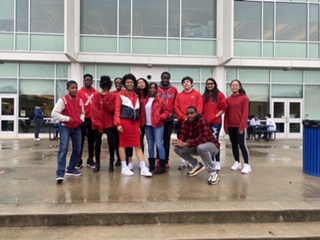A Look Back at 2020’s Black History Month

Photo courtesy of Yasmin Anderson.
Chamblee’s Be.U. members wear red, an important color in the Pan-African flag.
Since its official recognition in 1976, Black History Month has been celebrated by Americans on a widespread scale during the month of February. And Chamblee Charter High School is no exception: African-American students at Chamblee routinely use the month to reflect on and celebrate their rich culture, as well as share and educate students about black history. One of the biggest promoters and celebrators this year was Chamblee’s Black Excellence Understood club, also known as Be.U.
Be.U. ‘s founder and president, senior Kirsten McManus, spoke about why Black History Month is so important for people of all races.
“I feel as though [Black History Month] is very important to everyone, even if you’re not black or don’t know anybody who is black,” said McManus. “It really doesn’t matter because you have been influenced or affected by black history, some way in your life, whether it was through music, culture, food, clothes, swag—anything like that. Everyone has come in contact with black culture and history.”
Language Arts teacher Yasmin Anderson, Be.U. ‘s faculty sponsor, has a slightly different perspective on the importance of educating students about black history.
“Growing up, I came from an area where black history was not talked about much or taught, and I just wanted to be a teacher that would educate students that there are a lot of things that have happened in our history that black people are known for that they probably did not recognize or realize,” said Anderson. “And it’s just not focused on the black students learning about black history. I want everyone to understand that a lot of things that we do, that we’ve learned, fall short of having an understanding [about black history] unless we keep trying to gather more information about it.”
Junior Sam Wondsen also offered his thoughts on Black History Month.
“I think it’s great that there’s a month where people can truly appreciate [black people] in the past that advanced not only black people’s well-being, but also the well being of humanity as a whole,” said Wondsen.
Throughout February, Be.U. has done many things to celebrate Black History Month, such as a morning announcements bingo game, karaoke and trivia during lunch. Additionally, they encouraged students to wear either black, red, green or yellow on each Wednesday of the month.
“[With karaoke] we wanted just to bring the culture of music and everybody coming together to Chamblee. Also, on Tuesdays we tried to do Trivia Tuesdays. Be.U. was trying to really bring out some things from history that are names and people that you’ve probably never heard of before, which kind of forces students to Google and learn about some of these things. On every Wednesday of the month we chose a particular color that connected with the Pan-African flag where it shows the black, red, green, and yellow to symbolize unity and bringing everybody together,” said Anderson.
In addition to this, Be.U. also organized multiple other activities, including a screening of The Hate U Give, a film based off of author Angie Thomas’s novel of the same name. Students were additionally given the chance to tour local historically black colleges and universities (HBCUs) and were also encouraged to don their HBCU apparel.
“We visited an HBCU for Black History Month so students could go to a historically black college and be able to see that we do have colleges for us that are there to teach us about our culture,” said McManus.
McManus offered one final reason as to why black history is so important to her personally, as well as the African-American community as a whole.
“Black history is really just a beautiful and outstanding thing, and I’m very passionate about my history and my culture. I feel like it’s such a beautiful culture and to be black and to come from queens and kings, is amazing,” said McManus. “It is beautiful when you learn about what we’ve done in the past and things we invented, created and done that are used in everyday life. It just amazes me how black people have come so far. We’ve gone through everything that could possibly be done to us, and we still are resilient: we come back stronger, we are persistent and we just are vibrant, amazing people. I just love everything about black culture.”
Your donation will support the student journalists of Chamblee High School Blue & Gold. Your contribution will allow us to print editions of our work and cover our annual website hosting costs. Currently, we are working to fund a Halloween satire edition.

Oliver Hurst is THE senior staff writer. You can find him going to Fernbank, talking about his dog, and binging a show on Netflix. This is his third year on the staff.

Shay Martin is a senior, and this is their second year as a writer for the Blue & Gold. Outside of school, they enjoy watching movies, walking their dogs, and listening to music. In five years, they hope to be doing something with writing, no matter what it might be.





